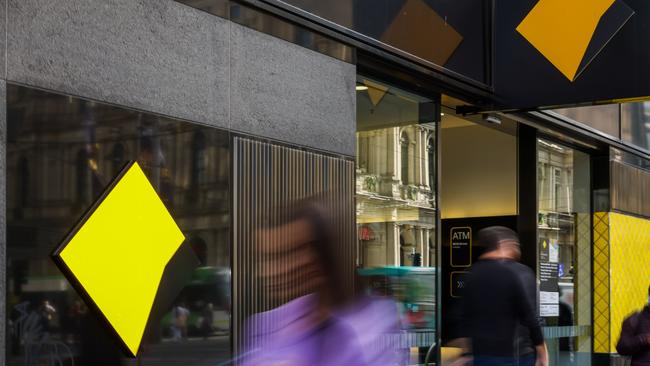Matt Comyn’s CBA quietly hits a new and remarkable milestone
There are big forces helping Commonwealth Bank to defy gravity and quietly move up the pecking order to be the 11th biggest bank in the world.

Business
Don't miss out on the headlines from Business. Followed categories will be added to My News.
Matt Comyn’s Commonwealth Bank quietly hit a new and astonishing milestone this week. It briefly overtook global major HSBC in terms of market value, putting the Australian bank on the doorstep of the top 10 banks in the world.
The new banking pecking order, where CBA moved to number 11, was partly helped by a pullback in HSBC shares, but also the momentum of a 30 per cent-plus run in the Australian bank’s shares this year.
CBA’s march this week to a new record has given it market value in excess of $251bn. London-based HSBC, which has branches across every corner of the world, closed on Tuesday night with a value of $247bn.
CBA gets an advantage over its big global banking rivals, given it is one of two banks in the top 15 that avoids having to hold additional funds on its balance sheet. This helps support its relative returns.
Despite its size, its Australian and New Zealand focus means regulators don’t see it as systemically important to the global banking system.
Bigger rivals like JPMorgan Chase, Bank of America, China’s ICBC, Wells Fargo and even HSBC have global linkages and a failure would have a severe impact on the world’s economy. For this reason they attract a capital “penalty” designed to make them safer.
CBA has already been running hot this year, but a near 10 per cent share price gains over the past month has been powered by the “big switch” which is well underway.
In Australia, fund managers have limited options among big liquid stocks to park their funds. And the choice often really comes down to backing miners or banks.
With so much uncertainty around the outlook for China’s economy, particularly with US president-elect Donald Trump’s tariff regime, Australian miners have been bearing the brunt of this. The Aussie dollar too has been coming under pressure on the China slowdown story.
Fund managers are switching out of miners, putting their funds in something big and safe with reasonable returns – and that’s CBA. It is even more attractive than its big four rivals given its massive exposure to the Australian housing market, and even with toppish prices still has strong underlying fundamentals.
That’s why Westpac – another big Aussie house market play – has also been gaining at the expense of business-focused NAB.
It’s not fundamentals, but rather external factors driving CBA. If it was being traded on fundamentals, there’s a lot to like.
CBA’s $2.5bn profit for the September quarter was up 5 per cent on the quarterly average and slightly ahead of market expectations. The results show CBA’s momentum rebounding in business lending, which is growing in line with the broader market, and mortgages, which CBA is growing at 1.3 times system.
New customers for CBA’s flagship retail bank continued to grow in the face of a competitive market, with an increase of 121,000 accounts in the quarter. The numbers suggest lending losses have started to bottom, particularly among the leading indicators of personal and credit cards – that’s a good sign for the economy.
Even so, the numbers weren’t enough to hold on to the share gains over the past week. CBA closed down 0.5 per cent.
This comes down to the thing that’s confounding the market. CBA has run so hot that none of the dozen or so market analysts that track the stock have a buy recommendation on it. Essentially CBA has gotten so large, its earnings capacity is not able to support its $250bn market valuation.
When the HSBC milestone was put to Comyn by The Australian, he was quick to reply that valuation wasn’t something he was concerned about.
“We are very focused on our strategy, serving our customers, consistent execution, and controlling the things that we can, which is obviously all of those, and delivering that consistently over the long period,” he said.
Comyn said being the biggest bank in Australia comes with higher expectations from all stakeholders and his team were very conscious of this.
Cost control
One theme coming through the recent wave of big bank results shows operating expenses are pushing higher as lenders grapple with wage rises, while ramping up the level of tech investment.
ANZ last week revealed spending on its new ANZ-Plus banking platform has so far come in at $2.5bn and annualised expense growth was running at 6 per cent.
NAB’s new boss Andrew Irvine too outlined plans to boost annual investments from $1.6bn average of the past few years to $1.8bn.
Westpac had the highest absolute increases in expense growth among the results, growing 7 per cent on the year, this was partially as a result of increased spending on its “Unite” tech program to untangle its operating systems.
CBA’s quarterly numbers show operating expenses haven’t pulled back, although the nation’s biggest bank has done much better than its big spending rivals.
It has held expense growth a 3 per cent, even with a new 4.25 per cent staff pay deal starting in July and increased investment spending. The 3 per cent September quarter expense growth was still below inflation and has remained consistent for more than a year.
Comyn says higher costs were still being felt even with signs inflation is cooling. However, even with a slower economy this is not the time to be cutting back on investment. CBA has spent around $2bn a year for the past few years on investment with the bulk of this going to productivity and growth initiatives, which include tech.
“We certainly continue to be focused on managing those (costs) appropriately, and we want to keep investing for the long term, which we think is really important, strategically and being able to make sure we’re delivering the best experience for our customers,” the CBA boss says.
ASIC’s war on waste
ASIC’s war on waste
It’s worth taking notice when a regulator stands up and talks about over-regulation.
That’s what Australian Securities and Investments Commission chair Joe Longo has done. In a speech to be delivered on Thursday to ASIC’s Annual Forum, it has pointed out rising regulation can also slow down those who are enforcing it.
Longo says the single biggest challenge in enforcement and protecting the interests of the community and business is the complexity of regulation. Essentially, bad or ill thought out regulation makes for bad outcomes.

The issue is less about rollback of regulation, but rather about the often overlapping regulation and lack of clarity when politicians are drafting rules.
“As a regulator, our experience is that simplicity means enforceability. That’s good for consumers and investors – they get justice and outcomes – and it’s good for businesses who get clarity about what’s required of them,” Longo will say.
ASIC is in a unique position in that it also makes laws through legislative instruments that it also enforces. The agency often gets feedback that the guidance it issues is too much or too little.
Longo is taking this a step further, forming his own “red tape committee” taking feedback from business leaders, directors, industry groups and consumer advocates to address complexity in law. Reducing complexity is a good thing, but Longo will need to be mindful it doesn’t mean that good laws are being watered down.
At one end of the scale, rules around misleading and deceptive conduct are some of the most potent corporate rules going, given they are clear and precise. Business knows where it stands, just a much as regulators know how to effectively enforce the rules.
At the complex end of the scale are “reportable situations” rules requiring financial licence holders to self-report breaches. These rules have required countless modifications and guidance notes to ensure the industry is meeting its obligations.
“If we continue on the path we’re on, we will undermine how effectively consumers and investors can exercise their rights, and we risk a chilling effect on productivity and innovation as businesses struggle to decipher and anticipate regulatory requirements,” says Longo, a former top corporate lawyer.
ASIC’s annual forum runs over two days and includes speeches from ACCC chair Gina Cass-Gottlieb, AFP chief commissioner Reece Kershaw, RBA governor Michele Bullock and new productivity commissioner chair Danielle Wood.
johnstone@theaustralian.com.au
More Coverage
Originally published as Matt Comyn’s CBA quietly hits a new and remarkable milestone




